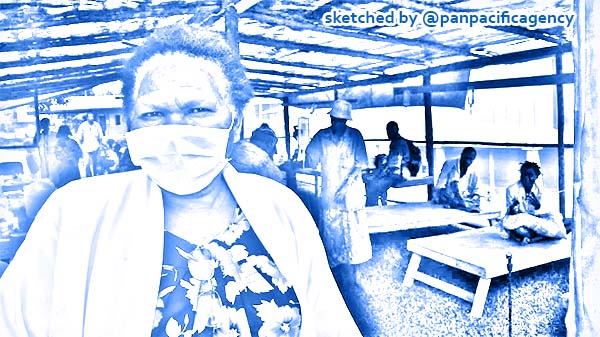Fears for stranded refugees as coronavirus emergency escalates in Papua New Guinea

Sister Lorna Yokowar, a nurse working at Daru Hospital in Papua New Guinea. Source: AAP. Sketched by the Pan Pacific Agency.
PORT MORESBY, Jul 31, 2020, SBS News. The Australian government is being urged to evacuate refugees from Papua New Guinea as a coronavirus outbreak escalates in the country’s capital, SBS News reported.
Papua New Guinea has declared a state of emergency after a spate of infections in Port Moresby, with 72 cases and two deaths recorded by Friday.
As of 30 June there were some 121 refugees living in-transit in Papua New Guinea, and some 137 refugees living on Nauru, according to statistics from the Department of Home Affairs.
The Human Rights Law Centre urged the Australian government to act swiftly to protect the refugees stuck in Papua New Guinea and Port Moresby.
“The Australian government has always been responsible for the people it has cruelly detained in indefinite detention offshore – that duty of care does not disappear during a pandemic,” legal director David Burke said.
“Everyone deserves to be safe in this public health crisis including the people detained in PNG and Nauru.
“After seven long, painful years, the Morrison government must let people rebuild their lives in safety – either here or in New Zealand.”
Refugee and human rights activist Shaminda Kanapathi was detained in Papua New Guinea after arriving in Australia in 2013.
“After years spent in detention we are all susceptible to COVID-19,” he said.
“Our health has been left to deteriorate over these past years without proper access to medical facilities for physical or mental health.
“Many of us already have compromised auto-immune systems and PNG does not have the capacity to look after non-residents.”
Mr Kanapathi said the refugees should be evacuated to Australia immediately.
“It is time to take immediate action in order to prevent the virus from spreading throughout the community. Immediate evacuation is imperative in order to prevent a spike in infection and tragic loss of life.”
Earlier this week Papua New Guinea Prime Minister James Marape announced the country’s first suspected coronavirus fatality – a 35-year-old health worker diagnosed with COVID-19 who died in an intensive care ward.
Health and government authorities are on high alert, particularly in the crowded capital Port Moresby where there are concerns a major outbreak could be devastating.
Mr Marape announced the city will be placed into a 14-day lockdown, with gatherings limited to 15 people.
Residents will be given seven days to obtain masks, after which point they will be mandatory.
“Us in Papua New Guinea, we are not superhuman beings. We are not immune from it,” Mr Marape said earlier this week.
“Each and every one of us can get COVID-19 and we must all work side by side supporting each other.
“This morning we sat in the National Security Council meeting and in those deliberations, it became evident that a greater isolation strategy needs to be deployed.”
There are also concerns the actual rate of infection could be significantly higher, with testing across the country extremely limited.
The country’s COVID-19 isolation facility in the capital has a limited capacity and may be overrun by the end of the week.
“[That centre] has a 72-bed capacity. When we reach the capacity, we may have to consider other possibilities, including home quarantine,” Dr Paison Dakulala, the deputy controller of PNG’s national pandemic response, said.
Staff at the country’s main hospital, Port Moresby General, have raised concerns for their safety due to staff shortages from those being forced into quarantine and over a lack of personal protective equipment.
“Our challenge is to continue to attend to all normal emergencies to save more lives, and at the same time ensure we and our patients are safe from COVID-19,” hospital chief executive Dr Paki Molumi said.
The Department of Home Affairs has been contacted for comment.